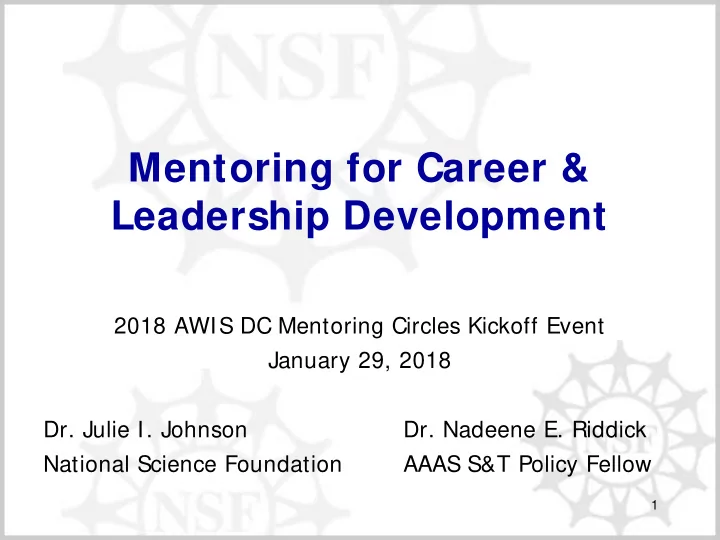

Mentoring for Career & Leadership Development 2018 AWIS DC Mentoring Circles Kickoff Event January 29, 2018 Dr. Julie I. Johnson Dr. Nadeene E. Riddick National Science Foundation AAAS S&T Policy Fellow 1
AGENDA A. Welcome and Introductions B. Getting to know you – Understanding Preferences C. Mentoring Basics • What is mentoring? • Relational Mentoring • Phases of Mentoring • Successful vs Unsuccessful mentoring • Goal Setting • Feedback & Assessment tips D. Conclusion & Reflection Questions
GETTING TO KNOW YOU Who’s Here? Who has had a mentor? Who has been a mentor? Has your previous experience involved • one-on-one mentoring? • group mentoring? • mentoring someone older than you? Your burning question about • finding/working with a mentor? • being a mentor to others?
Understanding Preferences 4
GETTING TO KNOW YOU NORTH Acting – “Let’s do it”; Likes to act, try things, plunge in WEST EAST Paying attention to Speculating – likes to detail – likes to know look at the big picture the who, what, when, & possibilities before where, & why before acting acting SOUTH Caring – likes to know that everyone’s feelings have been taken into consideration & that their voices are heard before acting
GETTING TO KNOW YOU Reflection about the directions/styles 1. List 4 adjectives describing the strengths of your style. 2. List 4 adjectives describing the limitations of your style. 3. What style do you find most difficult to work with and why? 4. What do people from the other directions or styles need to know about you so you can work together effectively? 5. What do you value about the other 3 styles?
MENTORI NG BASI CS 7
WHAT IS MENTORING? Mentoring is a collaborative learning relationship between individuals who share mutual responsibility and accountability for helping the mentee work toward the fulfillment of clear and mutually defined learning goals. Mentoring is used to assist individuals at specific stages of development or transition and lasts for a sustained but defined period of time. The mentoring relationship provides a developmental opportunity for both parties and can thus be of mutual benefit .
WHAT IS MENTORING? Traditional Mentoring vs. Relational Mentoring • • Mentor acts as expert Focus on mutuality & reciprocity • Mentor does not expect • to learn from mentee Both parties expect to grow & learn • One way influence from • ‘expert’ mentor to ‘naïve’ Shared influence mentee
RELATIONAL MENTORING (1) Relational mentoring follows a reciprocal perspective and focuses on the following: • • Pers rsonal learn rning and Relian ance on on com om m unal al nor orm s: gro row t h : Both mentor and Mentors and mentees give without mentee educate each other of expecting repayments from each different expertise one may other have that the other does not • rat ion : Encouraging I nspira “mutual inspiration” where both mentor and mentee are inspired to perform at a higher level
RELATIONAL MENTORING (2) Relational mentoring follows a reciprocal perspective and focuses on the following: • Sha hared inf nflue uenc nce and nd m ut ual respect ct : Both mentor and mentee have reciprocal influence, mutual empathy and concern, and vulnerability • Relat ional t ru rust and com m i m m it m e m ent : Both mentor and mentee commit to each other and the mentoring relationship
3 PHASES OF MENTORING Setting Progression Building Rapport Direction Feedback Empathizing Goal Setting Challenge Listening Effective questioning
WHAT IS MENTORING? Successful Mentoring • Provide constructive feedback; receive feedback • Offer advice; not forcing mentors ideas on mentee • Clear communication; communicate as peers • Takes time to build rapport • Genuine interest in personal and professional well-being of mentee • Managing expectations • Personal commitment to support mentee for pre- determined time frame • Respect mentee and his/her ability and right to make own choices
WHAT IS MENTORING? Unsuccessful Mentoring • Poor communication skills (e.g., listening, open-ended questions) • Lack of interest in personal well-being or personal/prof goals • Disconnected, unfriendly, didn’t seem to care about mentee • Misaligned expectations – mentor had different goals than mentee • Offering advice that was not applicable • Criticized, judged mentee
SETTING DIRECTION GOAL SETTING • As part of a mentor experience, you should create a plan that identifies the goals and milestones. • Think about your developmental goals for the year. For each, you will identify resources, obstacles, and strategies to develop as a professional.
GOAL SETTING The top five actions of those who successfully attain their behavior change goals: 1. They choose only 1 –2 goals to work on. 2. They make their behavior change goals public. 3. They ask colleagues for ‘feedforward’ suggestions on their goals. 4. They create a simple action plan to follow. 5. They make their goals visual to remind themselves and others.
GOAL SETTING Leadership Challenges • Effectively delegating responsibility • Decision-making • Trust • Communication • Treading the friendship/enforcer relationship • Confidence in speaking and sharing your thoughts with groups • Building teams that work effectively • Knowing when to stay on sideline and when to offer your thoughts to group • Dealing with difficult people
GOAL SETTING MAPPING YOUR PROFESSIONAL PATHWAY
PROGRESSION
PROGRESSION Keep in mind that change is hard! And it is a cycle. (Stages of Change Model; Prochaska & DiClemente, 1982)
PROGRESSION FEEDBACK & ASSESSMENT • Giving and receiving feedback is important. • It’s important to check in during the relationship to see how things are going. ►
22
Recommend
More recommend